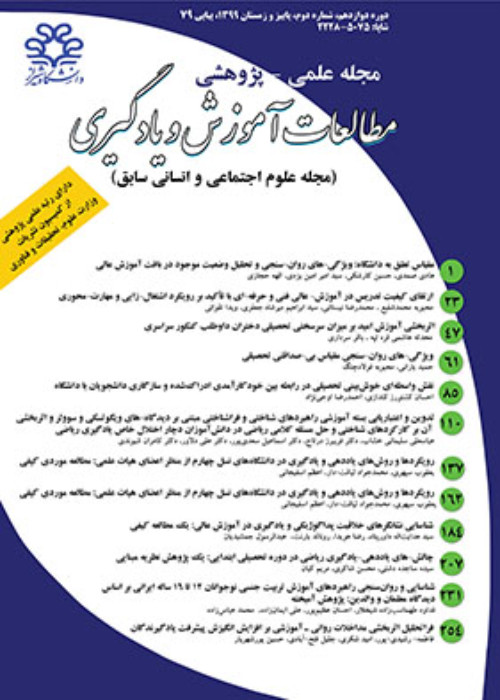The Mediating Role of Moral Disengagement in the Relationship between Moral Identity and Academic Counterproductive Behavior
One of the most important challenges of facing educational institutions and centers is the involvement of individuals in academic counterproductive behaviors. Counterproductive behavior is an intentional behavior that violates the significant norms of an organization and threatens the well-being of the organization, its employees or both (Robinson & Bennett, 1995). Academic counterproductive behavior is one of the most important subjects of in the field of educational field. Academic counterproductive behavior is against the contrary of university citizenship behaviors (Schwager, Hülshegar, Lang, Klieger, Bridgeman, & Wendler, 2014). Academic counterproductive behaviors are divided into two categories: other-focused behaviors (that harm others) or self-focused behaviors (that harm the student himself) (Robinson & Bennett, 1995). Academic counterproductive behaviorIt has has ten main dimensions: cheating, using drugsdrug use, telling lieslie, plagiarizingplagiarism, showing discriminating behaviors, absencegetting abscent, having passive presence, procrastinatingon, getting lazyiness (indolentce) and peer pressure. Research evidence suggests that academic counterproductive behavior prevents academic achievement and hurts the learning process (Crede & Niehorster, 2009). Moral disengagement refers to a set of eight cognitive mechanisms that decouple one's internal moral standards from one's actions and facilitate engaging in unethical behavior without feeling distress (Moore, 2015). Moral disengagement could be considered as a cognitive distortion that allows individuals to view immoral behavior and its negative consequences in a socially and morally favorable way (Farnese, Tremontano, Fida, & Paciello, 2011). Moral disengagement mechanisms are include moral justification, euphemistic labeling, advantageous comparison, displacement of responsibility, diffusion of responsibility, disregard or distortion of consequences, and dehumanization and attribution of blame. Moral disengagement mechanisms are known as the tendency to justify immoral behaviors in order to protect one’s self-esteem (Caprara, Fida, Vecchione, Tramontano, & Barbaranelli, 2009). Moral identity has been described as a kind of self-regulatory mechanism that motivates moral action (Blasi, 1993). ItMoral identity has two dimensions: the private dimension, which is called internalization that and refers to the self-importance of moral characteristics, and the general dimension is which is referred to as symbolization. According to the cognitive-social theory, individuals behave immorally in spite of having moral standards, because of moral disengagement mechanisms. Researchers consider moral identity as moderating the impact of moral disengagement mechanisms (Aquino, Reed, Thau, & Freeman, 2007). The pPresent study has investigated the mediating role of moral disengagement in the relationship between moral identity (internalization and symbolization) and academic counterproductive behavior.
1. Can moral identity (internalization and symbolization) directly predict academic counterproductive behavior? 2. Can moral identity (internalization and symbolization) directly predict moral disengagement? 3. Can moral disengagement directly predict academic counterproductive behavior? 4. Does Moral disengagement play a mediating role in the relationship between moral identity and academic counterproductive behavior?
The study enjoyed a A correlational research design was used in this research, with m. Moral identity internalization and symbolization were being the predictor variables and a. Academic counterproductive behavior was being the criterion variable. Moral disengagement mechanisms were the mediator variables. The statistical population consisted of all students of technical and professional schools of in Shiraz city. The participants were 220 students (110 females, 110 male) who were selected by through cCluster sampling method. Moral disengagement mechanisms were measured by Moral Disengagement Scale (Bandura, 1995). Academic counterproductive behavior was measured by Academic Counterproductive Behavior Scale (Rimkus, 2012) and mMoral identity and its components were measured by via Self-Iimportance of Moral Identity Scale (Aquino & Reed, 2002). The rReliability and validity of instruments were justifiedconfirmed. The data was analyzed using Data analyzed by AMOS software.
The results of the Structural Equation Modeling (SEM) showed that the proposed model has a good fitness with the default model. The fFindings further indicated that moral internalization and symbolization could not directly predict academic counterproductive behavior. Besides, it was found Findings also showed that moral internalization has a negative and significant effect on moral disengagement. = β) -0/52, p= 0/001). According to the findings, moral sSymbolization could not significantly predict moral disengagement. The fFindings further showed suggested that moral disengagement has a positive and significant effect on academic counterproductive behavior (β= 0/61, P= 0/001). The rResult of the bootstrop test, on the other hand, indicated that, moral disengagement has a mediating role in the relationship between moral identity internalization and academic counterproductive behavior. The research causal model could explain 36 percent of the counterproductive behavior variance.
The goal of this study was to investigate the mediating role of moral disengagement in the relationship between moral identity and academic counterproductive behavior. According to the study findings, moral identity did not have a direct effect on academic counterproductive behavior. Moral identity internalization could negatively predict moral disengagement. On the other hand, moral identity symbolization couldn’t significantly predict moral disengagement. Besides, moral disengagement had a positive effect on academic counterproductive behavior. The results of the bootstrap test showed that moral identity internalization, by decreasing moral disengagement, could lead to a decrease in academic counterproductive behaviors among students. Overall, the results of the present research provided evidence for the mediating role of moral disengagement in the relationship between moral identity and the students’ academic counterproductive behavior. This finding is consistent with the results of the studies that point to the moderating role of moral disengagement (Kavussanio, & Ring, 2017, Moore, 2015, Farnese, Tremontano, Fida, & Paciello, 2011, Hyde, Shaw, & Moilanen, 2010). Moral disengagement mechanisms separate the individuals' internal standards from the interpretation of their behavior and neutralize them, thereby enabling individuals to set aside their moral standards (Moore, 2015). The results of this study contribute to the explication of the available information about the factors involved in the relationship between academic counterproductive behavior, moral identity and moral disengagement.
- حق عضویت دریافتی صرف حمایت از نشریات عضو و نگهداری، تکمیل و توسعه مگیران میشود.
- پرداخت حق اشتراک و دانلود مقالات اجازه بازنشر آن در سایر رسانههای چاپی و دیجیتال را به کاربر نمیدهد.


